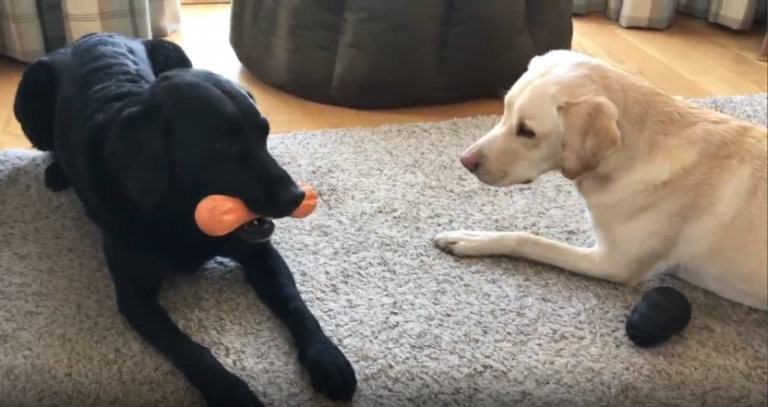I often hear clients say that they don’t have any good stories to tell. They think their stories always have to be about spectacular things that happened. Or that they have to have a big budget for fancy videos and big screen presentations. The truth is that a great storyteller can turn the most mundane activity into a captivating tale.
Scottish sportscaster Andrew Cotter gives us a master class in how to do just that in his viral videos about his dogs Olive and Mabel. (Watch them here or scroll to the end). Captured with a phone, each video is just a single shot – no titles, music, effects or filters.
So what makes these stories work?
There’s a clear problem to solve.
Within the first 30 seconds, we know exactly what each story is about. Who can disgrace themselves more on a walk? Who can eat breakfast the fastest? Who will win possession of the bone? That makes it easy for us to engage in the rest of the story because we’re not wasting mental energy trying to figure out what’s going on.
They have high stakes.
Cotter turns ordinary activities into extraordinary events. The Game of Bones. The Dogs’ Breakfast Grand Final. The Walk of Shame. His backyard, living room and driveway become global arenas in our minds, the stage for a competition that means the world to the characters.
He cuts to the chase.
We don’t have to sit through a big lead up or explanation of why we’re here. Two of the three videos start when the story is almost over. And that’s okay. Our narrative intelligence fills in any gaps from our previous experiences listening to stories, watching sports and interacting with pets. We’re hard-wired to be able to jump right in. When you start your stories off with action, you stand a much better chance of engaging listeners.
He keeps things moving.
Even though it looks like nothing is happening, especially in the last two stories, Cotter makes them seem action-packed – highlighting details, wondering what the characters will do next, and reminding us that time is running out and what’s at stake. “Olive has to make a move if she wants to stay in this.” He switches the lead in the competition back and forth, keeping us guessing, and in suspense about who will actually win. “20 seconds to go now and Olive closing in on victory and that coveted prize of being told she’s a very good dog.”
We can’t guess the ending.
This is one of the most important tips to engaging audiences – don’t be predictable. Cotter does a brilliant job of this, by introducing new obstacles that could affect the ending. Mabel had worm medicine the night before the eating competition. Will that slow her eating down? Olive discovered a dead squirrel earlier. Should she go back and roll in it? Olive changes her grip on the bone as time’s running out. Will she lose it in the final seconds?
We relate to the characters.
Anyone who’s had a dog can understand the frustrations and joy he shares. Especially in the third video on the walk, Cotter is the hapless dog owner, whose dogs ignore him and get into trouble. As Mabel stands in the pond, he observes, “She’s doing nothing at all and that’s the beauty of it. No recognition, no recall at all. A stare that says ‘I’m doing what I want and have zero respect for you.'” When she hops out of the pond, he continues, “And there we are, shaking all over my jeans. A tail wag of apology – but she doesn’t even mean it.”
We get to know Olive as the older dog, the veteran and role model, from the old Labrador school. For her, eating is a serious business. Don’t bollux around wagging your tail.
And we cheer for Mabel the youngster, losing the breakfast competition and “looking to offer congratulations to Olive, the dog that was her inspiration growing up.”
The details sing.
Cotter’s narration does more than describe the action. His choice of words triggers our senses and evokes emotion. We see Mabel standing in “the fetid pond, letting all the unplesantness soak in” and Olive, leading the disgraceful behaviour competition by “eating three kilos of grass and upsetting a small child.” It’s important to note here that he’s not overly descriptive; one or two well-chosen words are all he needs to set the scene.
He goes all in.
Cotter commits fully to the premise of the stories, treating them the same as intense, global competitions like the Masters (for which he’s known). That makes it easier for us to suspend disbelief and engage in the journey because it’s real to him.
He’s funny and sad at the same time.
While the storyteller’s dry wit makes us smile with subtle cracks about things like the dogs’ lack of opposable thumbs, his final lines also make us cry a little at the heartbreak he’s feeling. “Join us again tomorrow for live coverage of a snooze on the sofa.” “I’ll just stare at the trees and think about getting a cat.” By reflecting on his fate as one of the world’s top sportscasters who’s been reduced to doing play-by-play of his dogs by the pandemic, he reminds us that we’re all in this together.





